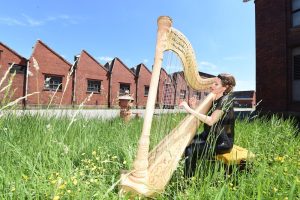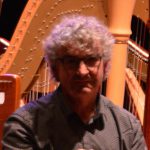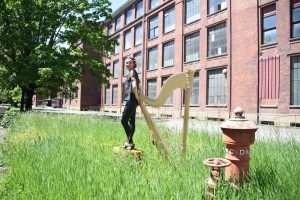Camac Blog
Camac weekend, Saint-Louis: March 21 – 22, 2020
News
February 24, 2020
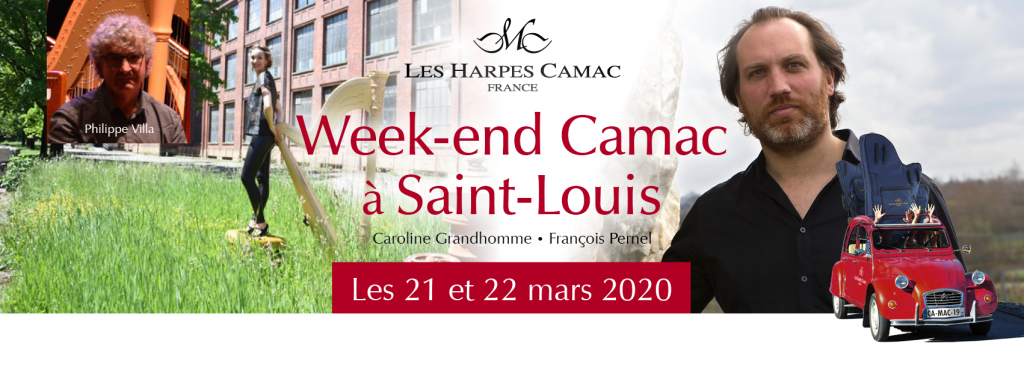 Over the weekend of March 21-22, at the Conservatoire municipal de musique et de danse in Saint-Louis, we are delighted to be sponsoring the work of Caroline Grandhomme. Her harp weekend is underpinned by a number of particularly thoughtful, pedagogic concepts – thereby promising a valuable experience for students throughout the Alsace region. “I want this weekend to be open to all music students, regardless of level – and just not to harpists, either!”, she explains. “I also want everyone attending to have fun, be inspired, and learn something on which they can continue to build.”
Over the weekend of March 21-22, at the Conservatoire municipal de musique et de danse in Saint-Louis, we are delighted to be sponsoring the work of Caroline Grandhomme. Her harp weekend is underpinned by a number of particularly thoughtful, pedagogic concepts – thereby promising a valuable experience for students throughout the Alsace region. “I want this weekend to be open to all music students, regardless of level – and just not to harpists, either!”, she explains. “I also want everyone attending to have fun, be inspired, and learn something on which they can continue to build.”
When Caroline asked us to collaborate on her project, she already knew whom she wanted to invite. “François Pernel”, she says, unhesitatingly. “I didn’t know him personally at all, but I have long admired his work. He incorporates a lot of the oral tradition into his teaching, which is a completely different way for students to learn. To have some experience of this is so good for students taking fundamentally classical lessons; otherwise, they can be so busy reading their score, that they forget to listen. Listening carefully to what you are playing is essential for a strong sense of rhythm – the basis of all music, everywhere -, for your understanding of the music, your concentration…and for listening to others, so you can play together. So the first thing I’ve asked François to do, is to give a workshop on playing by ear. This will take place on Saturday morning, and is open to pupils of all ages and all levels.”
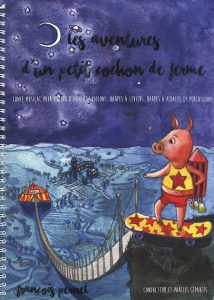
You can buy François’s conte musical from – you guessed it – the Camac webshop!
“Another reason why I wanted to invite François”, Caroline continues, “is because I knew he’d written a musical story: Les aventures d’un petit cochon de ferme [“The Adventures of a Little Farm Pig”]. I love musical stories, because they also open up so many new experiences for students. First of all, putting on a show is great for your all-round performance skills. There are lines to learn as well as your harp part, there’s comedy to bring over to the audience, costumes to make and wear…and everyone is working together. The children learn first-hand that everyone contributing to a shared goal, means a fantastic group success. Even better, François has written his tale for harp ensemble, violin, percussion and children’s choir. Other departments at the Conservatoire have come on board, and immediately our young harpists see that they are not isolated in a niche, as the harp can sometimes be.
I also think it’s enormously valuable for students to be able not only to meet the composer of the piece they are learning, but also to work on it with him. Of course, I’ve already worked with them, but François will arrive and point out new things. Young students assume their teacher knows everything there is to know, and that’s the end of the matter. As they grow up, they discover that it’s not as black-and-white as that, and that music is rich in layers of perspective and emotion.
We’re also all hugely looking forward to François’s own concert, on Saturday evening. His incomparable musical originality is going to amaze our audience – blow their minds, even – about what the harp can do!”
After François’s Saturday morning workshop on March 21st, and before the dress rehearsal for the grand finale begins on Sunday, Caroline has included something more: a lecture by Philippe Villa, professor at the Nancy Conservatoire. We had the joy of working with Philippe on our tenth Camac Festival in 2015; he has been the first teacher of so many well-known French harpists, and is respected and loved in equal measure.
Caroline Grandhomme wanted Philippe to present his now-published harp method to Saint-Louis students. Particularly, it contains a section about dealing with nerves, and this will be the focus of his lecture on Saturday afternoon. Anyone can struggle with performance anxiety, be they young or older, beginner or professional, and this lecture, like the whole weekend, is open to all.
Meanwhile, Camac’s Pierre Le Levier will be in situ with our touring exhibition. He’ll also give a short talk, about Camac harps are made, and the history of our company. “I think it’s important to give parents, particularly, the chance to hear about how their child’s instrument is made, and to be able to ask questions”, Caroline emphasises. “It’s reassuring and supportive for them.”
An impassioned, thoughtful teacher, Caroline recently cemented her pedagogic commitment by means of the state teaching qualification (known in France as the concours administratif). She is an equally active performer, a frequent concerto soloist with orchestras in the Alsace / Basel / Baden-Württemberg region – and she brought out two albums last year. In fact, only one disc had been planned: for Caroline’s soprano, cello and harp trio, via crowdfunding. The campaign was so successful that Caroline and her colleague, cellist François Berne, were able to record a duo CD as well. You’ll find much to inspire you in both discs, full of unexpected, beautiful and virtuosic arrangements. These range from the Lieder of Richard Strauss and Franz Schubert, to music by the Boulanger sisters, Sergueï Taneyev,Gabriel Fauré, Maurice Ravel, Joachin Nin and even Haydn’s Stabat Mater’s Lagrimoso.
Since last October, Caroline has also been involved in another type of music-making – one which is attracting increasing attention, because of its powerful benefits. “I regularly play in a large hospital in Mulhouse”, she explains. “I play all over the hospital – in all departments, and for the staff as well as the patients. The response has been incredible, and you really feel the power of music, see the effect it has on both body and mind. The personnel are more relaxed and have more energy and focus for the patients; the patients can think about something other than their illness for a while, which I hope eases their suffering. I’ve found it very humbling to work there, because being able to help people in this way, for me that is the essence of music.”
Attendance at all events throughout Caroline’s harp weekend in Saint-Louis is entirely free of charge. You can reserve your seats here, via the online form on the Camac agenda.

